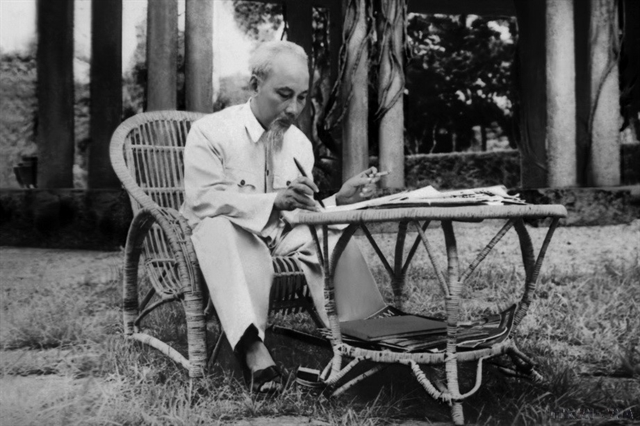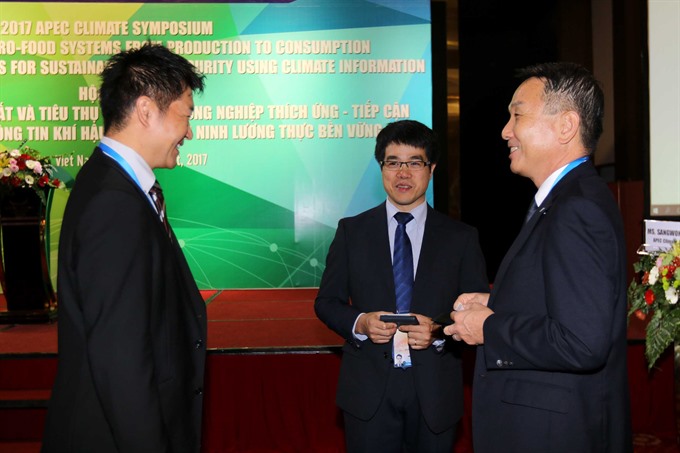 Environment
Environment

Water governance in APEC economies, climate change, food security and best practices in agriculture are among the topics to be discussed at the first APEC Water Resources Authorities Meeting for Food Security that opens today in Cần Thơ.
 |
| Delegates talk at the 2017 APEC Climate Symposium on building resilient agro-food systems from production to consumption for food security using climate information opened in the Cửu Long (Mekong) Delta city of Cần Thơ on August 18 within the framework of APEC Food Security Week. — VNA/VNS Photo by Thanh Vũ |
CẦN THƠ — Water governance in APEC economies, climate change, food security and best practices in agriculture are among the topics to be discussed at the first APEC Water Resources Authorities Meeting for Food Security that opens today in Cần Thơ.
The two-day event is part of a project titled “Challenges for Water and Food Security in the context of climate change in the APEC region,” which seeks to increase awareness of the pressing challenges in and solutions to water governance and management to support food security in the face of increasing climate change impacts and growing population in the APEC region.
Speaking at the event, Javier Martinez from the Peruvian Ministry of Agriculture and Irrigation said his country proposed to organise the first APEC meeting of authorities responsible for water resources management and food security to strengthen the relationship and future co-operation between authorities, experts, the private sector, and academia.
This project aims to identify gaps in water resources management and development strategies and share best practices and experiences in water use for food security.
Besides this, the meeting will also offer technical lectures and present an overview of the results and findings of a preliminary report on water resource management in APEC based on information received from member economies for the first research mapping survey.
Martinez said: “As you know climate change has a direct impact on water supply, affecting food production, posing limitations to economic growth and creating social conflicts.
This is compounded by weak governance in some economies, and thus the sustainable use of water resources must be improved to ensure food security and effective climate change adaption measures.”
Trần Kim Long, director general of the Ministry of Agriculture and Rural Development’s International Co-operation Department, said water is one of the most important elements for food production.
"The relationship between climate change, increasing droughts and population growth has been as intimate and present-minded than ever," he said.
It was reasonable to conclude that the world would be short of water to produce food to meet the increased demand from the growing population, he said.
It is estimated that agriculture currently accounts for 70 per cent of the world’s water use. Water shortages are threatening food security and public health.
Identified as an economy significantly affected by climate change and rising sea levels, Việt Nam is also located downstream of two important international rivers, in which two-thirds of the water in Việt Nam flows from neighbouring countries.
"Therefore, the availability of freshwater and water management are priorities in agriculture development policies," he said.
At a symposium on "Building resilient agro-food systems from production to consumption,” Hong-Sang Jung, executive director, APEC Climate Centre, said "food security is one of the most central concerns of the 21st century".
As the world’s population would exceed nine billion by 2050, the world needs to produce at least 50 per cent more food by that time, according to Jung.
However climate change has traumatised the sufficient and stable drive of food.
The conference would be a place for policy makers and experts to exchange concrete ideas, information and opinions to tackle the issue of food security, which Jung said would require an inter-disciplinary approach and joint work by invited experts.
Deputy Minister of Natural Resources and Environment Nguyễn Linh Ngọc said enhancing food security and sustainable agriculture in response to climate change is the priority of APEC Việt Nam 2017.
"Food security is one of the top concerns in APEC as it contributes 55 per cent of global agricultural produce. Food security is also listed as the second goal in the United Nations’ 2030 Agenda for Sustainable Development."
This event would improve understanding of weather and climate information to effectively utilise it to enhance food security and sustainable development, he added.
Đào Anh Dũng, deputy chairman of the Cần Thơ city People’s Committee, said the Mekong Delta, comprised of Cần Thơ and 12 provinces, contributes more than 90 per cent of Việt Nam’s rice exports, 60 per cent of fisheries exports and more than 50 per cent of fruit and vegetable exports.
Agricultural production and rural livelihoods depend entirely on natural conditions.
"Climate change has been a complex issue, especially with floods in 2011 and saline intrusion in 2016, that has caused great damage to agriculture production in the entire Mekong Delta, affecting social stability and the sustainable development of the community."
According to local and international experts, the unpredictable weather conditions have severely affected agriculture and aquaculture production.
"The main focus is to link production and consumption, ensure environmental protection and the sustainable exploitation of resources, and adapt to climate change," Dũng added.
News from SOM 3 will be updated later. — VNS




